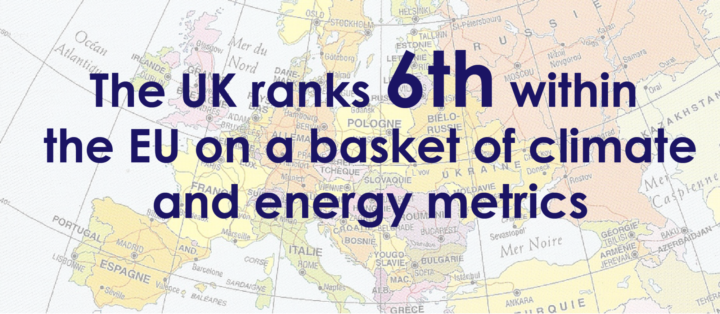Climate change and clean energy: Is the UK ahead of the pack?
As MPs deliberate the fifth carbon budget, we take a look at how the UK fares compared to other EU nations
By Jonny Marshall
Share
Last updated:
Within Parliament and the media, the UK is often reported as moving quicker than the rest of Europe toward its long-term climate goals. As far ago as 2011, George Osborne said we are ‘going to cut our carbon emissions no slower but also no faster than our fellow countries in Europe’ – the implication being that we’re leaving Europe in our wake.

The latest report by the Energy and Climate Intelligence Unit shows that, among its European peers, the UK is distinctly average in terms of progress in cutting emissions and building a clean energy system. This is in contrast to opinions often reported in the media, stating that UK emissions are falling faster than the EU average, that the UK government ‘insists on going faster than other countries in emissions reduction’, or that the UK is reducing the burden to be shared among other EU member states.
So how did we reach our conclusion?
Most claims that the UK is charging ahead stem from the comparison of single measures. But single measures can be quite misleading; so our analysis uses a ‘basket’ of seven metrics, reflecting current and historical trends in carbon emissions, the uptake of renewables and other clean energy technologies, and how efficiently we use energy.
To meet the ambitious 2050 climate goals set by both the UK and the EU (a cut of emissions of 80-95% from 1990 levels), energy systems need to undergo drastic change. The EU 2050 roadmap aims for two-thirds of energy to come from renewable sources, with near-complete decarbonisation of electricity generation, despite increasing demand. The UK’s Climate Change Act has similar targets, utilising five-year carbon budgets into law to smooth the transition.
At the end of the transition, countries will be blessed with independence from fossil fuel imports and minimised exposure to volatile commodity markets – and probably lower energy costs too, as technologies such as wind, solar and nuclear generate very cheaply once they’re up and running.
The next UK carbon budget to be set, the fifth, will account for emissions between 2028 and 2032. The Committee on Climate Change, the statutory advisory body, has proposed a 57% reduction on 1990 levels.
The government is due to approve the budget by the end of June, but it’s causing some friction in the Conservative Party. In April, 20 Tory backbench MPs wrote a letter to David Cameron urging him to accept the CCC recommendations in full, while 12 signed a cross-party letter to Amber Rudd arguing the opposite position. The CCC’s proposals received the backing of the cross-party Energy and Climate Change Select Committee.
To meet the 2050 goals, sustained investment is needed in all aspects of the transition to a low-carbon economy: new clean power plants, grid upgrades, renewables, low-carbon heating and cooling systems, smart meters, low-carbon vehicles, etc. Plus gains in energy efficiency. The precise recipe is different for each country because they’re coming from very different situations historically, and each has a different economic mix. But in all cases, investment on a sufficient scale will only come with stable, long-term policies.
Using our basket of seven indicators, we looked at the UK’s place in the entire EU28, and within the ‘Big Five’ countries with comparable GDP, population size, etc – the UK, Germany, France, Spain and Italy.
On both of these comparisons, progress made in the UK appears entirely unremarkable. We come in third of the Big Five, which are in fact remarkably evenly matched – France wins, though it’s by a short head, and Germany trails. Within the EU28, we’re in sixth place – to change sporting analogies, we’re in the main peloton of 18 countries, well behind runaway leader Sweden but well ahead of the real stragglers such as the Netherlands, Estonia and, somewhat inevitably, Poland.

When you look in detail at some of the data, you begin to see just how misleading it can be to use only a single metric. For example, France is a clear winner among the Big Five in having low emissions per person, low emissions per unit of GDP and a high proportion of overall energy coming from non-carbon sources. But these all date back to the oil crisis of the 1970s, and the government’s decision to invest heavily in nuclear energy (building 56 reactors in 15 years) and, to a lesser extent, in renewables. So they’re not an indication of current momentum.
Spain, meanwhile, is in a paradoxical position. Its big push on wind and solar came to an end in 2012 when the financial crisis forced the abandonment of subsidy schemes. However, its emissions have continued to tumble – also as a result, principally, of economic circumstances.
These examples and others validate the methods we chose for this report. They show you can’t gain a sensible indication of a country’s overall progress by measuring one thing. Just as you’d rank a restaurant across its full range of starters, mains and desserts – not to mention service standards – you have to look across the full menu of clean energy and climate measures in order to see meaningfully how countries compare.
And when we do this, it seems that Mr Osborne’s vision has come true; Britain is moving neither faster nor slower than Europe as a whole. As things stand, comparing progress is no reason for reducing the rate of UK decarbonisation, for example by seeking to weaken the fifth carbon budget proposal.
In fact, the challenge to government points in the opposite direction. Almost all of our data points pre-date the ‘bonfire of low-carbon’ policies that Mr Osborne and Amber Rudd enacted last year. They have slowed UK decarbonisation. Other low-carbon options, notably Hinkley, stubbornly fail to materialise. Logically, therefore, the UK may find itself moving inexorably backwards through the peloton without a fairly swift draught of policy powerade.
Share